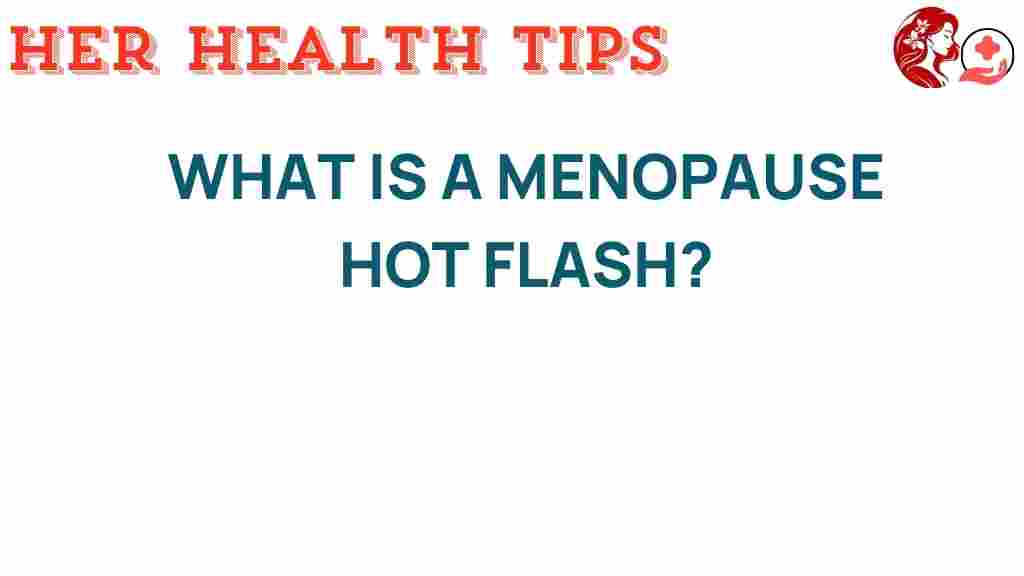Unraveling the Mystery of Menopause Hot Flashes: What You Need to Know
Menopause is a natural biological process that signifies the end of a woman’s reproductive years. During this transition, women experience various symptoms, among which hot flashes are the most notorious. Understanding menopause and its associated symptoms is crucial for women’s health. This article aims to unravel the mystery of menopause hot flashes, exploring their causes, symptoms, and effective relief strategies, alongside lifestyle tips to manage temperature regulation during this time.
What Are Hot Flashes?
Hot flashes are sudden feelings of warmth, often accompanied by sweating and discomfort. They can occur at any time, day or night, and can last from a few seconds to several minutes. Hot flashes are primarily linked to hormonal changes during menopause, particularly the decline in estrogen levels. This fluctuation affects the body’s temperature regulation, leading to these uncomfortable episodes.
Symptoms of Hot Flashes
Hot flashes can present differently for each woman, but common symptoms include:
- Sudden warmth in the upper body, often starting in the chest and moving to the face and neck.
- Flushing of the skin, especially on the face and neck.
- Increased heart rate or palpitations.
- Excessive sweating, leading to damp clothing or bedding.
- Chills following the hot flash as the body cools down.
- Difficulty sleeping due to night sweats.
The Role of Hormonal Changes in Menopause
During menopause, the ovaries gradually produce less estrogen, leading to significant hormonal changes in a woman’s body. These changes can affect various bodily functions, including:
- Temperature Regulation: Estrogen plays a crucial role in regulating body temperature. Its decline disrupts the hypothalamus, the brain’s temperature control center, triggering hot flashes.
- Menstrual Cycle: Irregular periods are often one of the first signs of menopause.
- Mood Swings: Hormonal fluctuations can lead to increased irritability, anxiety, and mood swings.
- Sleep Disturbances: Hormonal changes can lead to insomnia or disrupted sleep patterns.
Women’s Health: Understanding Menopause
Menopause typically occurs between the ages of 45 and 55, but it can vary widely. Understanding this phase is vital for women’s health, as it impacts physical, emotional, and mental well-being. Regular check-ups with healthcare providers can help women navigate these changes effectively.
Relief Strategies for Hot Flashes
While hot flashes can be uncomfortable, several relief strategies can help manage their frequency and intensity:
1. Lifestyle Modifications
Implementing certain lifestyle changes can significantly reduce the occurrence of hot flashes:
- Avoid Triggers: Identify and avoid triggers such as spicy foods, caffeine, alcohol, and stress.
- Stay Cool: Wear lightweight, breathable clothing, and keep your living environment cool.
- Regular Exercise: Engage in regular physical activity to enhance overall health and reduce stress.
- Healthy Diet: Incorporate a balanced diet rich in fruits, vegetables, whole grains, and lean proteins.
2. Relaxation Techniques
Stress management is crucial during menopause. Consider implementing:
- Meditation: Practice mindfulness or meditation to help reduce stress and anxiety.
- Yoga: Incorporate yoga into your routine to improve flexibility and promote relaxation.
- Deep Breathing: Use deep breathing exercises to calm the mind and body during a hot flash.
3. Medical Advice and Treatments
Consulting a healthcare provider is essential for personalized advice. Some medical treatments include:
- Hormone Replacement Therapy (HRT): This treatment can help balance hormone levels and alleviate hot flashes.
- Non-Hormonal Medications: Certain medications, such as SSRIs and SNRIs, may help reduce hot flashes.
- Vitamins and Supplements: Some women find relief with herbal supplements or vitamins, but it’s essential to discuss these with a doctor.
Temperature Regulation Tips
Effective temperature regulation can help mitigate the impact of hot flashes. Here are some tips:
- Dress in Layers: Wearing layers allows you to adjust your clothing according to your comfort level.
- Use Fans: Keeping fans on in your home can provide a cooling effect during hot flashes.
- Hydration: Drink plenty of water to stay hydrated, especially during hot weather.
- Cool Showers: Taking cool showers can help lower your body temperature effectively.
Troubleshooting Hot Flashes
If hot flashes persist despite trying various relief strategies, consider the following troubleshooting tips:
- Keep a Journal: Track your hot flashes, noting when they occur and potential triggers to identify patterns.
- Consult a Specialist: If symptoms are severe, consider consulting a specialist in women’s health or menopause.
- Review Medications: Discuss with your doctor whether any current medications may contribute to hot flashes.
Conclusion
Menopause is a significant transition in a woman’s life, and understanding the symptoms, particularly hot flashes, is vital for women’s health. While hormonal changes can lead to discomfort, implementing effective relief strategies and lifestyle tips can help manage this challenging phase. Always seek medical advice for personalized treatment options and to ensure a smoother transition through menopause. Embrace this new chapter with knowledge and confidence!
For more information on menopause and women’s health, check out this resource. If you’re looking for professional advice, consider reaching out to your healthcare provider for tailored support.
This article is in the category Reproductive and created by HerHealthTips Team
